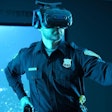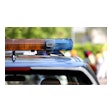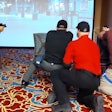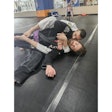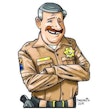During this critical period, your agency and your fellow cops are checking you out; make sure they like what they see.
Four years ago El Paso rookie police officer Angel Barcena, 38, was killed in the line of duty before he ever got off probation. He was the victim of a domestic situation gone south.
That's the first thing you need to know about surviving probation as a rookie law enforcement officer. It could very well mean your physical survival. So stay alert. And remember, everything you learned in the academy and everything you are going to learn on the job has the potential of determining whether you come home safely at the end of your shift.
Beyond physical survival of your probation period, your primary concern is making sure that you navigate this career hurdle and get to stay on the job. Most young cops who get terminated during their probation period commit career suicide by making bad decisions, using poor judgment, and associating with suspect friends.
I've been where you are and I worked a long and successful career before retiring last year with sergeant stripes from a major county agency. Here's some advice from me and other veteran offi cers that will help you make it to the next step in your career.
Put Your Best Foot Forward
It's old advice. But it's stood the test of time for a reason: It's good advice. Your innate investigative skills might render you a worthy successor to Sherlock Holmes, but if you look like crap, you're probably going to be treated like it, too. Start making a good impression by making sure that your uniform is appropriately tailored and pressed. Look squared away, act squared away, and many will consider you squared away.
Of course, that's only half the battle. Being truly squared awaygoes beyond looking the part. It means being the part. Do you routinely go in service with the tactical tools you need to handle situations? Do you have resource material-penal code and vehicle code books, jurisdiction maps, etc.-to answer those questions that may otherwise undermine your ability to do your job? Many agencies give their personnel lists of what they should carry in their posse boxes and gear bags. If yours doesn't, make your own.
Don't Piss Off Your Training Officer
For many agencies, the training process overlaps with the probationary period. And while you may not like the man or woman assigned to mentor you through your apprenticeship, you sure as hell had better respect the process and its implications for the two of you.
Most training officers are conscientious and truly want you to succeed. And perhaps for reasons that have nothing to do with you. Pass or fail, you are ultimately a refl ection of their performance as a training officer.
Think about it: If you had the opportunity to have a good street cop working next to you, wouldn't you want to help that person all you could to make sure he got off probation? Obviously, you'd have a vested interest in that person's success. Too often trainees are indoctrinated with tales of trainees gone wrong. But for every horror story that a TO has about trainees that shouldn't have been hired in the first place, there's another about the trainee that made the TO proud to have had the opportunity to have mentored him.
Your personality and work ethic have much to say about the approach your training offi cer takes with you. Do you show initiative? Or do you have to be dragged kicking and screaming and under duress of a TASER to the next call? Show enthusiasm (not exuberance) in handling your calls and observation-based activities, and your peers will take notice. Not only that, but your inevitable mistakes will not be so harshly assessed.
OK. Most TOs are great officers and great teachers. But there are the rare exceptions who couldn't find a felon in San Quentin and treat trainees like garbage.
Should you find yourself being treated in an unfair manner, document the problem and pursue the matter through appropriate channels in accordance with departmental policy. Resolving the matter may prove to be as simple as getting paired with a different training officer.
Warning: Make damn sure that there is actually a problem, not merely a perceived one. While some training officers are quite capable of evaluating trainees without bias, solidarity among others may find them acting in collusion to back one another's play.
You are not only being evaluated by your training officer but by everyone who stands to work with you in the future, and bad first impressions can be awfully difficult to overcome
Don't Confuse Responsibility With Privilege
Stan Lee, the creator of Spider-man, was onto something when he said, "With great power comes great responsibility."
But being responsible and acting responsibly are different matters. That's why when it comes to the prospect of rolling hard with lights and siren, detaining citizens, and using lethal and less-than- lethal force, you have to remain as professional as you are assertive. There have been those who have behaved otherwise, and they have paid the price for it.
Unfortunately, others-often peers or innocent citizens-sometimes pay the price for their actions, as well. Next to not getting killed or injured in the line of duty, the one thing I would never wish for a rookie cop is to find him- or herself responsible for the death of an innocent through negligent actions.
Law enforcement agencies share this opinion and take great pains to ensure that you don't make such mistakes. On the front end, this includes training you and supplying you with the equipment necessary to do the job. On the back end, it can include everything from in-house punitive actions to criminal filings.
Probationers tend to get slammed a little harder and for good reason. If they're a danger early in the game, they're more apt to be one later in the game as well. Best to get rid of them while it's reasonably easy to do so.
Roll With the Flow and Get Along
Some cops will bust your balls. Consider it a part of the apprenticeship because it is. Usually, there's no malice. It's payback for what they endured and a down payment for what you'll inflict on others-assuming you can't rise above the temptation.
Whether you're a wet-behind-the-ears youngster or a retiree starting a second career, you're still the new kid on the block. Be confident but not cocky and respect the chain of command.
Off Duty Means Just That
Th is is a two-fold concern. First, you want to avoid getting involved in off-duty situations if you can avoid them. You are not the cavalry. Unless you're facing down an active shooter or some other major threat to the public and yourself, it's best not to insert yourself into potentially dangerous situations.
Second, it isn't difficult for the average civilian to get into bar fights, pissing contests, and road rage situations without even trying. And it's absurdly easy to do so when you are emboldened with a gun and badge.
The sense of badged invincibility is as ephemeral as it is illusory. Some cops not only believe that the power of the badge will legitimize their actions, but that their badged brethren will co-sign for their actions and cover for them.
Get this straight. True professional courtesy is not putting another officer in that position. More than once as a patrol supervisor, I had an on-duty deputy ask me how to handle an incident involving an off -duty cop. In those instances in which a crime had inarguably been committed, I TOLD THEM TO ARREST THE INDIVIDUAL. I was not about to risk my livelihood just because someone had decided to jeopardize his.
Make Your Own Luck
Thoughts of mortality and long-term consequences are often way down the priority scale when you are starting out in an exciting new career. I know: I was once in your shoes, and am all too aware of how luck can play into the probationary equation in terms of who makes it or not.
That's why the younger you are, the more difficult you may find the rite of passage known as probation. The very physical stamina that may give you a perceived advantage over your old fart peer may actually be a liability. Parts of the brain that recognize various types of danger and implications for different actions may not be as sufficiently developed in young people as in those who have greater maturity.
This is the reason why gaining acceptance from your peers-fellow rookies-might be one of the most insidious threats to your career. Hang out with your buds. But use good judgment at off -training parties, on river trips, and during late night carousing. Incidents at such alcohol-rich events have claimed more than one probationer's career.
For many rookie officers there is no union right to fight a first year termination. Th at is a huge reason why getting off probation is, next to graduating from the police academy, the largest hurdle most officers will have in their career.
Don't worry about being lucky. Improve your own odds by listening instead of talking, by engaging your brain before you engage your mouth, by avoiding situations that could get you in dutch, and by acting like a professional at all times.
Getting off probation not only ensures a greater likelihood for long-term employment but the possibility of making the most of the career opportunities that will follow. I hope this advice helps you achieve your goal of being effective and successful law enforcement officers.
Stocking Your Posse Box and Duty Bag
Many agencies give their personnel lists of what they should carry in their posse boxes and gear bags. If yours doesn't, make your own.
The following is a list of a few necessities of life that every officer should carry on the job and that the vast majority of departments issue to employees. The bare necessities of life:
Good Carry Bag: I know of no departments that issue a carry bag. I personally use a Delta Tactical bag; all of this fits in it plus room. Check out Delta Tactical Inc. They make two excellent bags.(www.deltatactical.com).
Flashlight: Always have a good flashlight with carry method such as a ring on the duty belt or use some of the smaller ones with a spring clip. I am not going to recommend the standard D cell type, rechargeable, or new compact high-intensity light. This is up to department regulation and personal tastes. By the way, always pack extra batteries and bulbs. The traffic direction cones that slip on are nice as well.
First-Aid Kit and Protection: A small first-aid kit is always a plus; this can be for "self-first aid" and very helpful indeed. Gloves (usually issued) and resuscitation mask to prevent any cross contamination.
Good Puncture-Proof Gloves: These are a tactical must.
Safety Vest: The high-visibility, reflective vest should be issued, but if not, get one. It could mean survival on traffic details in the night.
Clipboard or Writing Platform: I know most departments are using mobile data terminals and other forms of technology. However, there is no substitute for a good clipboard when it comes to handling paperwork while standing and often behind the patrol car desk (steering wheel). Some invest in plastic or aluminum carry cases. Again, your choice.
Small Bag or Mini-Tackle Box for Whatnots: Every officer I know has one and it contains a variety of needful things. Small stapler, knife, lumber crayon (accidents), paper clips, extra flashlight bulb, lip balm, antacids, comb, nail clippers, quantity of "headache helper" (tablets or powders), extra "damits" for uniform, extra pen or pencil. All the little things of life you will need to make you happy in a bind. I have seen toilet paper, rubber bands, waterless sanitizing gel, wet wipes, eye-glass cleaner pads, multipliers or multi-function knives (either or both are a must). Throw a few extra adhesive bandages of smaller sizes to cover up nicks and cuts on your hands and to repel contamination. Other niceties of life could be an extra set of handcuffs, a few flexible plastic cuffs for special events, and a roll of 100 mph tape (duct tape). Did I mention extra ammo? Get a few boxes that are departmental exacts.
Good Quality Sunglasses: There are two schools of thought here. Some believe you will lose them or scratch them up, so go cheap. Others have found that quality optics will offer you better UV protection and will not distort your vision. I go with quality ones because they also make you look more professional. You may even want glasses that offer ballistic protection such as the many varieties made by Wiley-X.
Inclement Weather Bag or Pouch: If you have a rotational fleet then I strongly recommend you have in your POV trunk or locker a bag with the following items. You should have a raincoat, hat cover, gloves (cold weather types), a knit cap or cold weather head cover, and a towel to dry off with. If you are issued a vehicle just keep them in the back.
Secondary Weapon: Before you purchase one, visit your departmental rangemaster and get his or her recommendations. Note: Your department may have guidelines regarding secondary weapons.







